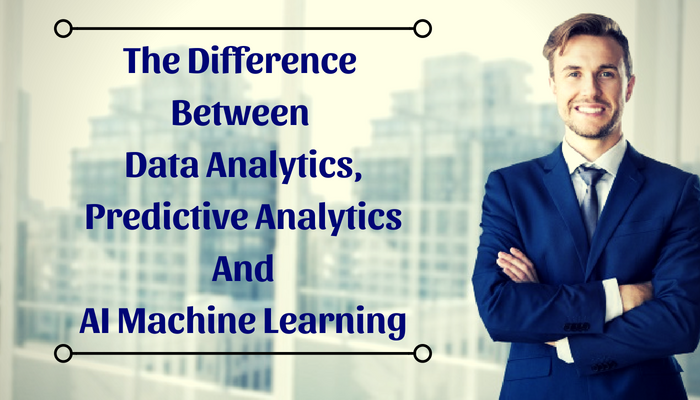|
8/2/2018 0 Comments The Difference Between Data Analytics, Predictive Analytics And AI Machine LearningArtificial intelligence is not a different concept. The technology has been with us for a long time, but what has become in current years is the power of computing, cloud-based service options and the applicability of AI to our jobs as marketers. But before marketers commit to and execute their AI strategy, they need to understand the opportunity and difference between data analytics, predictive analytics and AI machine learning. Data Analytics
Marketing managers have easily engaged with data analytics, benefitting (and most likely suffering) from the mountains of data at their fingertips. This includes everything from user-tracking data on apps and websites, newsletter conversion rates and online advertising click-throughs, to CRM data analysis. Data mining delivers vast quantities of data, often unstructured. Marketers are more familiar with interacting with data via dashboards that structure data to provide analysis of commonalities, such as averages, ratios, and percentages. The goal is to aggregate data to report a result, search for a model and find relationships between variables. Humans make assumptions, and data is queried to attest to that relationship. If valid, testing may continue on additional data. Data analysis is descriptive since it is based on past results. It does not divine the meaning of a change in a variable. Predictive Analytics Data analytics leads easily to predictive analytics using received data to predict what might occur. Predictions are based on historical data and rely on human cooperation to query data, validate patterns, create and then test assumptions. Assumptions drawn from past experiences presuppose the future will follow the same patterns. Predictive insights obtained from data analytics are beneficial to marketers. They can help predict campaign effectiveness, inform decision-making on collateral, geographic markets and demographics to target. But the more specific the desire to target and segment, the higher the time and cost demands, making successful, hyper-personalized campaigning nearly impossible. AI Machine Learning Machine learning is a continuation of the concepts around predictive analytics, with one fundamental difference: The AI system can make assumptions, test and learn autonomously. AI is a combination of technologies, and machine learning is one of the most prominent techniques utilized for hyper-personalized marketing. AI machine learning makes assumptions, reassesses the model and reevaluates the data, all without the intervention of a human. This changes everything. Just as AI means that a human engineer does not need to code for every possible action/reaction, AI machine learning can test and retest data to predict every possible customer-product match, at a speed and capability no human could attain. It’s not a subject of one or the other- it is significant that marketers understand the benefits and limitations of each. Simplified down:
0 Comments
|
|

